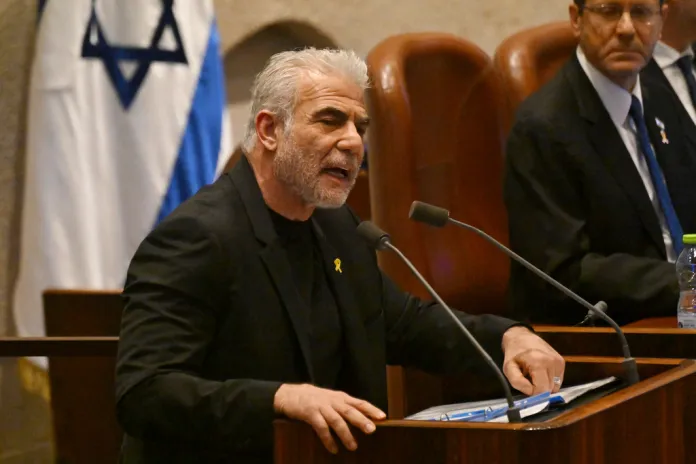Yair Lapid, the leader of Israel’s opposition, denounced the “extremist and failed government” of Prime Minister Benjamin Netanyahu, blaming it for the country’s current precarious position.
In an essay published in Foreign Affairs on the second anniversary of the Oct. 7, 2023, terrorist attack by Hamas, Lapid let loose some of his most scathing criticisms of Netanyahu’s government yet, buoyed by the possible end of the war in Gaza. Lapid blames the current government for trashing Israel’s diplomatic position in the world, harming its relationship with the United States, failing to combat rising antisemitism, harming Israel’s democratic foundations, failing to respond to Hamas’s surprise attack properly, and more.

“Israel is not a failed state. It is a great state with a failed government. Its foundations remain strong. Israel is undeniably in crisis, but the source of the crisis is not structural. It is political,” Lapid wrote.
He contrasted the current situation Israel has found itself in with three years ago, when the country was normalizing relations with the Arab world, boasted world-class research and business fields, and “blended a profound philosophical and historical depth with the best of modernity.”
He credited the sudden change not solely to Hamas’s Oct. 7 attack, but also to Netanyahu’s attempted judicial overhaul.
“The crisis is the result of an extremist and failed government, led by a prime minister, Benjamin Netanyahu, who is implicated in criminal cases and has lost the support of the Israeli public. His years in power have corrupted him and those around him. This government is openly contemptuous of the principle of a democratic State of Israel committed to Western liberal values. In its place, it seeks to install a theocratic and illiberal regime, one that is exempt from media scrutiny and free of the nuisance of concepts such as the rule of law and the constant threat of free and fair elections,” Lapid ruled.
Israel’s next priority after getting its hostages home should be the removal of Netanyahu’s government, he argued. And the chances of this are riper than ever due to President Donald Trump’s peace plan, he said.
Lapid touched on an exposed nerve in his criticism — the government’s response to the deadliest attack in Israel’s history on Oct. 7. He characterized the government’s response as lackluster and insufficient, neglecting displaced Israelis, failing to handle the domestic repercussions, failing to rebuild properly, and failing to combat antisemitism on the world stage sufficiently.
Instead, he hinted that “Misguided statements by the government’s extremist ministers” had actually worsened global antisemitism.
“The world has turned on Israel. The Abraham Accords are at risk of being frozen or reversed. Israel has lost its long-standing bipartisan support in Washington. The cries of ‘from the river to the sea’ on college campuses are an open call for the genocidal destruction of the Jewish state. When students at Columbia University and the University of Tehran scream the same slogans, Jews are right to be concerned,” Lapid said.
However, he argued that the problem lay not with Israelis but the government. In contrast to the government’s response, Lapid argued that Israeli civil society had behaved admirably in the aftermath of Hamas’s Oct. 7 attack, rallying its resources to support those in need and prevent an economic collapse.
“Where the government demonstrated contemptible weakness in its disarray and failure to marshal government resources, the Israeli public showed resilience, grit, and the determination to do what was needed,” he said.
The Israeli government’s actions had polarized and divided Israel, Lapid wrote, “exacerbated by the government continuously ignoring the will of the people and dragging on a war that no longer serves Israel’s national security interests.”
Though the essay was filled with rhetoric bemoaning the current situation, it also presented Israel’s problems as easy to solve. All that was needed, he argued, was a change in leadership.
“The world looks at Israel and sees a country in crisis. I look at it and see a country holding its breath. It is waiting for a new leadership to lead it down a different path. Israel’s future rests on the political decisions that Israelis will make in the coming year,” Lapid wrote.
“Should the current government stay in power, Israelis may instead find themselves condemned to international isolation, poverty, and increasing social rifts. If Israelis choose courage over cowardice, openness over isolation, prosperity over religious zealotry, the country’s best days will yet lie ahead,” he concluded.
The essay represents one of the most scathing attacks on Netanyahu’s government from the past two years, when domestic rivals were more wary of openly criticizing the government so as not to undermine national unity in a war most viewed as existential. This has teetered off after Hezbollah was neutralized, Iran degraded, and Hamas crippled. With the possible end of the war in Gaza at Trump’s direction, the safeguards against domestic criticism have largely disappeared.

